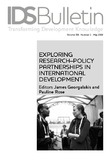Exploring Partnerships between Academia and Disabled Persons’ Organisations: Lessons Learned from Collaborative Research in Africa
| dc.contributor.author | Kett, Maria | |
| dc.contributor.author | T. Carew, Mark | |
| dc.contributor.author | Asiimwe, John-Bosco | |
| dc.contributor.author | Bwalya, Richard | |
| dc.contributor.author | Gitonga, Anderson | |
| dc.contributor.author | Nyehn, Boakai A. | |
| dc.contributor.author | Olenja, Joyce | |
| dc.contributor.author | Swartz, Leslie | |
| dc.contributor.author | Groce, Nora | |
| dc.coverage.spatial | Liberia | en |
| dc.coverage.spatial | Kenya | en |
| dc.coverage.spatial | Uganda | en |
| dc.coverage.spatial | Sierra Leone | en |
| dc.coverage.spatial | Zambia | en |
| dc.date.accessioned | 2019-06-06T08:28:02Z | |
| dc.date.available | 2019-06-06T08:28:02Z | |
| dc.date.issued | 2019-06-05 | |
| dc.identifier.citation | Kett, M., Carew, M. T., Asiimwe, J. B., Bwalya, R., Gitonga, A., Nyehn, B. A., Olenja, J., Swartz, L. and Groce, N. (2019) 'Exploring Partnerships between Academia and Disabled Persons’ Organisations: Lessons Learned from Collaborative Research in Africa' in Exploring Partnerships between Academia and Disabled Persons’ Organisations: Collaborative Research in Africa, IDS Bulletin 50.1, Brighton: IDS | en |
| dc.identifier.uri | https://opendocs.ids.ac.uk/opendocs/handle/20.500.12413/14520 | |
| dc.description.abstract | In this article, we discuss how our academic research on disability and international development in five African countries has benefited hugely from active collaboration with advocates, practitioners, and policymakers, ultimately ensuring that research evidence is used to inform policy and practice. Whilst building such partnerships is seen as good practice, it is particularly important when working on disability issues, as the clarion call of the disability movement, ‘nothing about us without us’, attests. This is not just a slogan. Without the active and critical engagement of disabled people – as researchers, participants, advocates – the evidence gathered would not have the same impact. This article discusses experiences from research in Liberia, Kenya, Uganda, Sierra Leone, and Zambia. It highlights the challenges and opportunities such partnerships can bring in achieving the goals of leaving no one behind and doing nothing without the active engagement and inclusion of persons with disabilities. | en |
| dc.description.sponsorship | Department for International Development (DFID) | en |
| dc.description.sponsorship | Economic and Social Research Council (ESRC) | en |
| dc.language.iso | en | en |
| dc.publisher | Institute of Development Studies | en |
| dc.relation.ispartofseries | IDS Bulletin;50.1 | |
| dc.rights | This is an Open Access article distributed under the terms of the Creative Commons Attribution 4.0 International licence (CC BY), which permits unrestricted use, distribution, and reproduction in any medium, provided the original authors and source are credited and any modifications or adaptations are indicated. http://creativecommons.org/licenses/by/4.0/legalcode | en |
| dc.rights.uri | http://creativecommons.org/licenses/by/4.0/ | en |
| dc.subject | Development Policy | en |
| dc.title | Exploring Partnerships between Academia and Disabled Persons’ Organisations: Lessons Learned from Collaborative Research in Africa | en |
| dc.type | Article | en |
| dc.rights.holder | Institute of Development Studies | en |
| dc.identifier.team | Imapct and Learning Team | en |
| dc.identifier.doi | 10.19088/1968-2019.106 | |
| dcterms.dateAccepted | 2019-06-05 | |
| rioxxterms.funder | Default funder | en |
| rioxxterms.identifier.project | Default project | en |
| rioxxterms.version | VoR | en |
| rioxxterms.funder.project | 9ce4e4dc-26e9-4d78-96e9-15e4dcac0642 | en |
Files in this item
This item appears in the following Collection(s)
Except where otherwise noted, this item's license is described as This is an Open Access article distributed under the terms of the Creative Commons Attribution 4.0 International licence (CC BY), which permits unrestricted use, distribution, and reproduction in any medium, provided the original authors and source are credited and any modifications or adaptations are indicated.
http://creativecommons.org/licenses/by/4.0/legalcode


